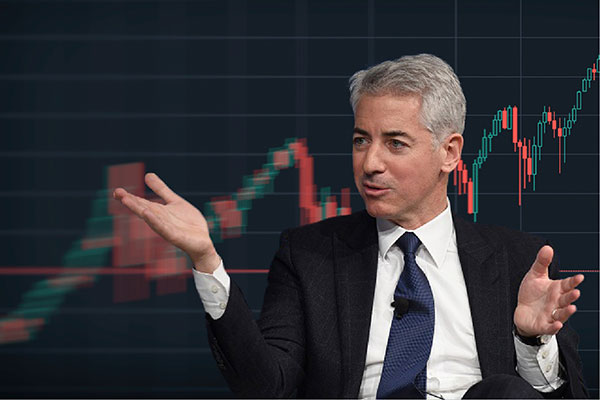Bill Ackman pledges ‘quieter’ route to investment riches
31st March 2022 09:33
by Sam Benstead from interactive investor
The manager of the FTSE 100-listed Pershing Square Holdings investment trust says he will no longer short company shares.

Star hedge fund manager Bill Ackman has ushered in a new, “quieter” era of his investment strategy, coined “Pershing Square 3.0”.
The New York-based stock picker, who manages the £7.5 billion Pershing Square Holdings (LSE:PSH) investment trust, told investors that he had moved away from public battles with companies to force them to change their businesses, as well as short selling, which had attracted a lot of media attention.
Instead, Ackman is embracing a less high-profile investment strategy and engaging with portfolio companies behind closed doors.
He said: “All our interactions with companies over the last five years have been cordial, constructive, and productive. We intend to keep it that way as it makes our job easier and more fun, and our quality of life better. So, if it is helpful to call this quieter approach Pershing Square 3.0, let it hereby be so anointed.”
Ackman was caught up in a media storm when he shorted shares of Herbalife (NYSE:HLF) in 2012, arguing that the health supplements company was a pyramid scheme. The campaign against the company was the subject of a documentary and ended unsuccessfully for Ackman, who closed his short position in 2018.
He said: “We have also on a few rare occasions engaged in the ‘noisiest’ form of activism, activist short selling, although this has been limited to two high-profile activist short engagements. Despite our limited participation in this investment strategy, it has generated enormous media attention for Pershing Square.”
- Biden’s first 100 days: the stock market boom
- Bill Ackman: an industry as certain as food and oxygen
- Bill Ackman: latest SPAC news and how to make his portfolio
Ackman’s investment vehicle dates back to 2004, with the investment trust launching in 2013. It has returned 17.1% a year on average for 18 years compared with a 10.2% return for the S&P 500 index of America’s largest companies.
Ackman’s investment approach is to buy high-quality businesses that generate predictable, recurring cash flows, and which he believes have limited downside.
He also takes out hedges against market drops to protect his portfolio. Early last year, before inflation had begun to take hold, Ackman bought protection against interest rates rising to combat higher inflation later in the year.
At an initial cost of $157 million (£119 million) – or 1.4% of PSH’s assets at the time – the hedge significantly increased in value and was sold in January this year for $1.25 billion.
The profits were invested into streaming platform Netflix (NASDAQ:NFLX), whose shares were 45% lower than their highs.
- Why Bill Ackman just took a massive punt on Netflix
- Bill Ackman: what I think of GameStop and shareholder activism
Ackman said: “Despite its large scale, Netflix is still in the early stages of capitalising on the decade-long secular growth in streaming video and corresponding decline in linear TV.
“Current subscribers amount to less than a quarter of today’s estimated total addressable market of 800 million to 900 million households that have either fixed broadband access or subscribe to television services.”
He also made money in early 2020 when markets dropped by buying protection against corporate bonds.
About 30% of Pershing Square Holdings is invested in music and video streaming (Netflix and Universal Music Group (EURONEXT:UMG)), 26% is in restaurants (Chipotle (NYSE:CMG), Restaurant Brands (NYSE:QSR) and Domino's (LSE:DOM)’s), 15% is in home improvement retailer Lowe's (NYSE:LOW) and the rest in real estate, hotel and railway stocks.
These articles are provided for information purposes only. Occasionally, an opinion about whether to buy or sell a specific investment may be provided by third parties. The content is not intended to be a personal recommendation to buy or sell any financial instrument or product, or to adopt any investment strategy as it is not provided based on an assessment of your investing knowledge and experience, your financial situation or your investment objectives. The value of your investments, and the income derived from them, may go down as well as up. You may not get back all the money that you invest. The investments referred to in this article may not be suitable for all investors, and if in doubt, an investor should seek advice from a qualified investment adviser.
Full performance can be found on the company or index summary page on the interactive investor website. Simply click on the company's or index name highlighted in the article.